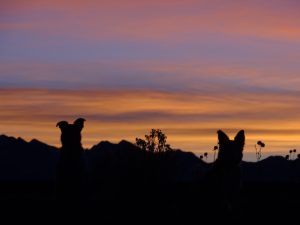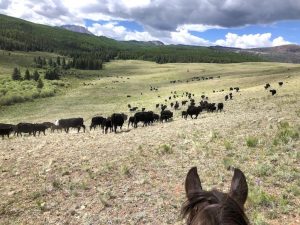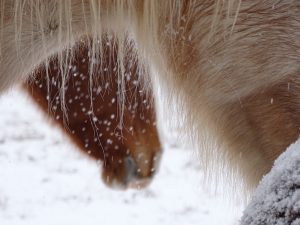Editor’s Note: The following essay appeared in the Washington Post. This is an expanded, unwashed-by-editors version. Read the WaPo piece here.
Maddy Butcher writes:
Thanks to 65 billion dollars allocated for broadband expansion in the infrastructure bill, country dwellers like me will inch closer to the convenience of connectivity that so many urbanites and suburbanites have experienced for years. Fiber optic growth is considered a precursor to greater cell reception, too. Therefore, in southwestern Colorado we can potentially take a call and stream a movie in our living rooms, something I could not do for five years. Wow!
 The digital divide was clearly and heartbreakingly exposed when schools shifted to remote learning last year. Many students, if they were old enough, had to drive dozens of miles and park outside school buildings or sit on the curb to attend virtual classes and submit homework. Students of driving age were having to shuttle younger siblings and parents struggled to juggle the scholastic challenges.
The digital divide was clearly and heartbreakingly exposed when schools shifted to remote learning last year. Many students, if they were old enough, had to drive dozens of miles and park outside school buildings or sit on the curb to attend virtual classes and submit homework. Students of driving age were having to shuttle younger siblings and parents struggled to juggle the scholastic challenges.
Disconnection was due in part to affordability, which school officials tried to mitigate by purchasing personal hotspots and laptops for students. But connectivity issues also come with the territory here. We have mountains and canyons: LaPlata Mountains, Sleeping Ute Mountain, McElmo Canyon, and Mesa Verde, to name a few. If you don’t have direct line of sight to a tower, forget about connecting.
The change is welcome, but I’m wary. Downsides to connectivity go beyond losing a call from someone you didn’t want to talk with anyway. Let me enumerate:
Relationships:
 Friends of mine worry about the deterioration of primary relationships. Not with partners, family, or close friends, but with nature.
Friends of mine worry about the deterioration of primary relationships. Not with partners, family, or close friends, but with nature.
“When I’m working out on the land, I never want to be connected digitally,” said Joe Morris of Morris Grassfed in San Juan Bautista, central California. “We like to be quiet. We want to be grounded, with animals and the land and with the mysteries we engage with.”
One day last summer, my young dog was injured, the chainsaw I was carrying damaged my saddle, and I pulled a hamstring, making it painful to get on and off my horse. In pitch dark, soaked to the core from steady rain, we got to the truck and loaded up for the hour’s drive home. It was another day informed, blessed even, by connection to land, animals, and the ever-evolving singularities of our interactions.
“Every day you’re reminded that you’re not the top dog,” said Cooper Hibbard of the Sieben Live Stock Company in Adel, Montana. “There are bigger forces at work and we are humbled every day.”
Safety and presence of mind:
 Working with animals and in isolation (alone, in the backcountry, or both) requires focus. When helping move cattle, I’m on a horse and using two border collies. There is steady, often unspoken interplay with the animals, the land, the weather, and time passing. How I position myself and how I anticipate events requires care and consideration. It’s the same for recreationalists, as we move across the earth. Missteps, which can lead to accidents, which can lead to injury, which can lead to hardship, develop quickly if we’re not paying attention.
Working with animals and in isolation (alone, in the backcountry, or both) requires focus. When helping move cattle, I’m on a horse and using two border collies. There is steady, often unspoken interplay with the animals, the land, the weather, and time passing. How I position myself and how I anticipate events requires care and consideration. It’s the same for recreationalists, as we move across the earth. Missteps, which can lead to accidents, which can lead to injury, which can lead to hardship, develop quickly if we’re not paying attention.
Silence your phone, you say.
It’s simple but not easy, as anyone who appreciates dopamine-reward loops can attest. For now, being out of range takes away the temptation and the need for extreme self-discipline.
Self-reliance:
And what of the dignified American principles of independence and self-reliance? Nowadays, we lean on connectivity for everything from plant identification to first aid to truck mechanics to trail navigation.
There is, however, a sort of reverse digital divide, where habitually connected citizens solve problems with YouTube tutorials and gig workers while the habitually disconnected McGuyver and make do. Being handy and resourceful is part of the rural experience. I can sew, knit, camp, change a tire, swing a hammer, fish, and fix fence. Most friends have more skills, strength, and savvy. Here, you pay attention to the weather and prepare for long winters because storms and lean times are inevitable. You develop feel. You learn to do things in the dark, like saddle your horse. More importantly, you learn to drop the reins and trust that horse, because she knows the way home better than you do.
Gatherings:
Technology and the pandemic have made online meetings more acceptable and feasible. Online everything is where we’re headed, but poorer mental and emotional health will follow, as the CDC found with kids and online learning. Rituals of potlucks, beanhole suppers, rodeos, and bars’ open mic and trivia nights are, slowly and thankfully, coming back. These gatherings are especially rich when we haven’t been in touch for a while. I bemoaned the move online, for the second year in a row, of the National Cowboy Poetry Gathering, the annual midwinter event in Elko, Nevada. Performer Randy Rieman, concurred:
“The Gathering has been a living thing in real time. The whole idea is human contact. It’s irreplaceable,” he said. “We get lonesome for one another and so look forward to that time of year. It’s life-lifting and provides decorations for your soul.” Instead, I’m making plans to get to the Outside Circle Show (also in Elko) and hope to see Randy at the Lone Star Cowboy Poetry Gathering, in Alpine, Texas.
Even disconnection for a day is sweet. When my friend and I come off the San Juan National Forest, into the town of Dolores (population, 1,100), we know our phones will light up for the first time all day. It’s like coming home to an answering machine or mail in the mailbox. Look what happened while you were away! There is no FOMO, only JOMO, the Joy of Missing Out.